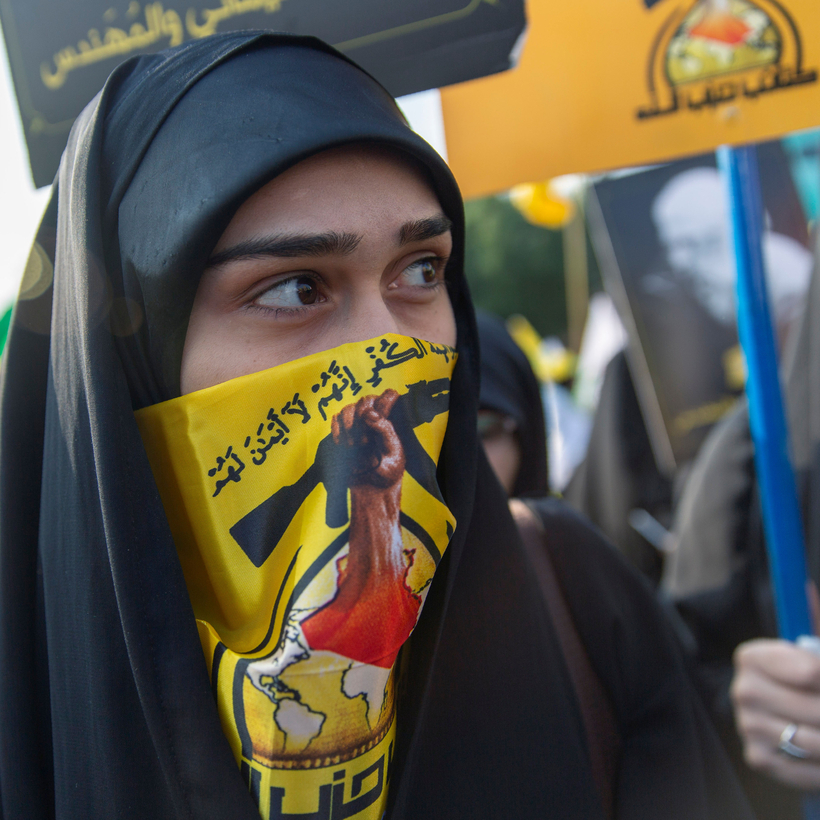On January 3, I woke before the dawn adhān in my room overlooking the Nile. Cairo, a chaotic, frenetic, and decrepit city, was unnaturally still, except for the evocative morning call to prayer.
I was on my way to a remote monastery in the desert to talk to Coptic priests about the rifts in Egyptian society since General Abdel Fattah el-Sisi took power in a military coup d’état in 2013. But as the light rose in the desert, and we drove deeper into the Wadi el Natrun, I heard a radio report that sounded improbable. Nearly one thousand miles away, in Baghdad, the Iranian top general, Qasem Soleimani, had been killed by an American drone attack. My first thought was that President Trump had achieved more than anything the Iranian government could ever contemplate: in one swift act lacking any long-term strategic thinking, he had united the frustrated Iranian people against their enemy.
Soleimani, the commander of the elite Quds Force of the Islamic Revolutionary Guards Corps, was an epic and pre-eminent soldier, responsible for Iran’s work in Yemen and Lebanon, but more notably for providing Bashar al-Assad’s Syrian regime with the strategy to push back the opposition rebels and attack key cities like Aleppo and Idlib.
In Syria and Iran, Soleimani was a hero. For those of us disgusted by his disregard for human rights on the Syrian battlefield, he was a monster. Still, killing him was, in Iran, the equivalent of killing General Patton.
Fighting for Assad
From Damascus, Soleimani trained the government militias whose “handiwork” consisted of appalling war crimes against civilians. He helped bring the Russians into the battlefield in 2015, convincing Vladimir Putin to join in the fight against the rebels. Russian planes then razed hospitals, schools, and civilian areas, contributing to the fall of Aleppo (and, eventually, Idlib). Security officials in the region claimed Soleimani had brought thousands of Shia fighters into the country to fight for Assad.

And now Egyptian television and radio were repeating that Egypt’s foreign ministry had called for “containment”: that the problem should remain a thousand miles away, in Baghdad, and not spread throughout the region. But containment in the Middle East is a near-impossible task. I’ve seen Egypt, as well as many other countries in the region, blow in a matter of days. Also, we were nearing the anniversary of the 2011 Tahrir Square revolution, when Egyptian activists ousted Hosni Mubarak in a matter of weeks, and other countries fell in line like dominoes. So much for containment. And I know enough to be wary of anniversaries in the Middle East.
Killing Soleimani was, in Iran, the equivalent of killing General Patton.
In Cairo today, Tahrir Square looks dusty and forlorn, nothing like it seemed in the heady moments I witnessed in 2011. The Egyptian revolution followed the Tunisian Jasmine Revolution, which had ousted the dictator Zine el-Abidine Ben Ali. Tahrir Square harnessed social media and used clever bloggers and activists trained by nonviolent influencers. It set a path for the next revolution, in Libya. Then came Syria.
We had high hopes for the revolution. But chaos followed, leading to the democratic election in 2012 in Egypt of the Muslim Brotherhood, who were soon pushed out and crushed by the military establishment. Sisi has little time for human rights, rule of law, or freedom of expression. A few weeks before I arrived in Egypt in late December, the offices of the liberal Mada Masr newspaper, led by Lina Attalah, a spirited journalist, were raided. Editors were arrested. After a demonstration in October protesting corruption in Sisi’s regime, several thousand people were detained, and many have vanished into the vast darkness of Egypt’s penal system.
The Mood in Cairo
In Cairo, the dissenters are no more. Most of the activists I knew who stood in the square for weeks, rallying the faithful, are either in prison, or abroad, or have been silenced by General Sisi’s repressive military regime. Local economies are dire; more than 60 percent of the country is poor or vulnerable, according to a recent World Bank report, and if you drive beyond Cairo, beyond the pyramids, into rural Upper Egypt, you find wide-scale discrimination of Coptic Christians. Soleimani and his actions in Syria and Yemen play less of a role here than the desperate task of feeding a family.
Indeed, in my forays last week to Cairo and Minya and beyond, I met Egyptians who seemed relatively unfazed by the Iranian debacle, largely because of their own urgent problems—mainly the poverty. “I think people here are more focused on buying bread than regional issues,” one of the former Tahrir Square protesters told me. “It’s like—how do I buy tomatoes? How do I buy bread?”
Diplomatic sources I spoke with seemed divided on blowback from the assassination. Some worried about the spike in oil prices and how that would affect the region. Some wondered what Iraq would look like in terms of security if the United States were forced to pull out entirely. And others echoed more far-reaching concerns that this would derail any Afghan peace plans. It will certainly, as we already suspect, embolden ISIS 2.0 and give Vladimir Putin a greater role in his new Middle East fiefdom. Already, he has tried to play peacemaker.
Only the Dead Know
While most people in Egypt that I spoke with this past week believe the risk of all-out regional war is remote, the death of Soleimani will drive an even greater wedge between the Sunni and Shia already battling it out for the corpse of Iraq.

I called many of my friends in the region to get their reactions to Soleimani’s death. What are we facing? Will the region rise up in war? “Only when we are dead will we not know war,” one said, paraphrasing the often misquoted (and misattributed) “Only the dead know the end of war.”
Soleimani is replaceable. Yes, his death is significant in terms of Iran’s regional policy, and in a sense it has united that nation, even among those who abhorred his methods. But the real danger is in Iraq. America’s partnership is in peril. The assassination has brought together a fragmented Shia political elite, and the shift from the street demonstrations of last month has now been funneled into anti-American sentiment.
The first act of vengeance and reprisals came on Tuesday, when more than a dozen Iranian ballistic missiles slammed into two American military facilities in Iraq. There were no casualties, but despite Wednesday’s announcement from President Trump that “Iran appears to be standing down,” it was, I suspect, a sign of things to come.
I don’t think World War III is around the corner. I do think the losers are the Iraqi people. The winners, however, are Iran and ISIS.
Janine di Giovanni is writing a book about Christians in the Middle East


